
Chile, officially the Republic of Chile, is a country located in western South America. It is the southernmost country in the world and the closest to Antarctica, stretching along a narrow strip of land between the Andes Mountains and the Pacific Ocean. With an area of 756,949 square kilometers (292,260 sq mi) and a population of 17.5 million as of 2017, Chile shares borders with Peru to the north, Bolivia to the northeast, Argentina to the east, and the Drake Passage to the south. The country also controls several Pacific islands, including Juan Fernández, Isla Salas y Gómez, Desventuradas, and Easter Island, and claims about 1,250,000 square kilometers (480,000 sq mi) of Antarctica as the Chilean Antarctic Territory. The capital and largest city of Chile is Santiago, and the national language is Spanish.

The territory of Chile has been populated since at least 3000 BC. By the 16th century, Spanish conquistadors began to colonize the region of present-day Chile, and the territory was a colony between 1540 and 1818, when it gained independence from Spain. The country's economic development was successively marked by the export of first agricultural produce, then saltpeter and later copper. The wealth of raw materials led to an economic upturn, but also led to dependency, and even wars with neighboring states. Chile was governed during most of its first 150 years of independence by different forms of restricted government, where the electorate was carefully vetted and controlled by an elite.

Salvador Guillermo Allende Gossens was a socialist politician, who served as the 28th president of Chile from 1970 until his death in 1973. As a democratic socialist committed to democracy, he has been described as the first Marxist to be elected president in a liberal democracy in Latin America.

Santiago, also known as Santiago de Chile, is the capital and largest city of Chile and one of the largest cities in the Americas. It is located in the country's central valley and is the center of the Santiago Metropolitan Region, which has a population of 7 million, representing 40% of Chile's total population. Most of the city is situated between 500–650 m (1,640–2,133 ft) above sea level.
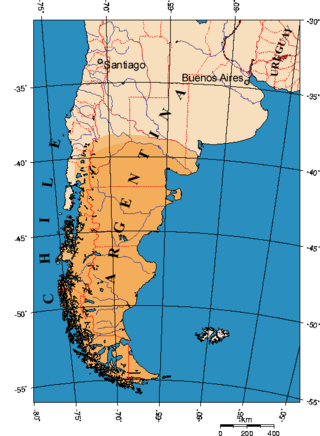
Patagonia is a geographical region that encompasses the southern end of South America, governed by Argentina and Chile. The region comprises the southern section of the Andes Mountains with lakes, fjords, temperate rainforests, and glaciers in the west and deserts, tablelands and steppes to the east. Patagonia is bounded by the Pacific Ocean on the west, the Atlantic Ocean to the east, and many bodies of water that connect them, such as the Strait of Magellan, the Beagle Channel, and the Drake Passage to the south.
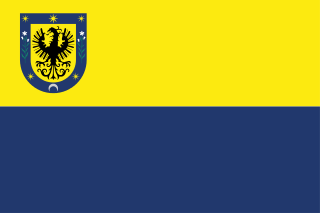
Concepción is a city and commune in south-central Chile, and the geographical and demographic core of the Greater Concepción metropolitan area, one of the three major conurbations in the country. It has a significant impact on domestic trade being part of the most heavily industrialized region in the country. It is the seat of the Concepción Province and the capital of the Bío Bío Region. It sits about 500 km south of the nation's capital, Santiago.
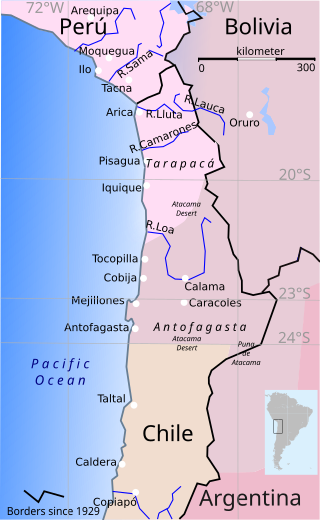
The War of the Pacific, also known as the Nitrate War and by multiple other names, was a war between Chile and a Bolivian–Peruvian alliance from 1879 to 1884. Fought over Chilean claims on coastal Bolivian territory in the Atacama Desert, the war ended with a Chilean victory, which gained for the country a significant amount of resource-rich territory from Peru and Bolivia.

The Mapuche is a group of native indigenous inhabitants of south-central Chile and southwestern Argentina, including parts of Patagonia. The collective term refers to a wide-ranging ethnicity composed of various groups who share a common social, religious, and economic structure, as well as a common linguistic heritage as Mapudungun speakers. Their homelands once extended from Aconcagua Valley to the Chiloé Archipelago and later spread eastward to Puelmapu, a land comprising part of the Argentine pampa and Patagonia. Today the collective group makes up over 80% of the indigenous peoples in Chile and about 9% of the total Chilean population. The Mapuche are concentrated in the Araucanía region. Many have migrated from rural areas to the cities of Santiago and Buenos Aires for economic opportunities.
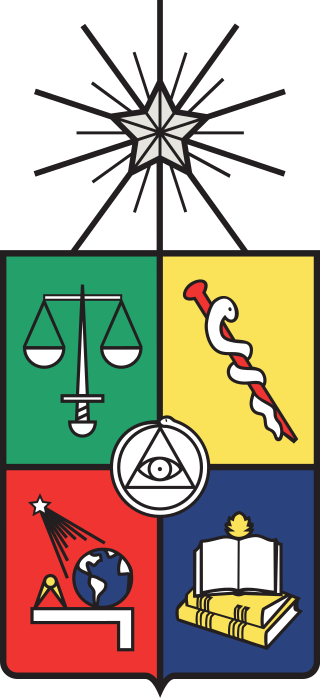
The University of Chile is a public research university in Santiago, Chile. It was founded on November 19, 1842, and inaugurated on September 17, 1843. It is the oldest in the country. It was established as the continuation of the former colonial Royal University of San Felipe (1738), and has a rich history in academic, scientific and social outreach. The university seeks to solve national and regional issues and to contribute to the development of Chile. It is recognized as one of the best universities in Latin America for its leadership and innovation in science, technology, social sciences, and arts through the functions of creation, extension, teaching, and research. It is considered the most important and prestigious university in the country.

The University of Santiago, Chile (Usach) is one of the oldest public universities in Chile. The institution was born as Escuela de Artes y Oficios in 1849 by Ignacy Domeyko, under the government of Manuel Bulnes. It became Universidad Técnica del Estado in 1947, with various campuses throughout the country. In 1981, as a consequence of a reform on higher education under the dictatorship of Augusto Pinochet, it became what is now known as Universidad de Santiago de Chile, with all activities centered in a single 340,000 m2 campus in the capital Santiago.

The 1973 Chilean coup d'état was a military overthrow of the Popular Unity government in Chile led by the democratic socialist Salvador Allende as president of Chile. Allende, who has been described as the first Marxist to be democratically elected president in a Latin American liberal democracy, faced significant social unrest, political tension with the opposition-controlled National Congress of Chile, and economic warfare ordered by United States president Richard Nixon. On 11 September 1973, a group of military officers, led by General Augusto Pinochet, seized power in a coup, ending civilian rule. In 2000, the CIA admitted its role in the 1970 kidnapping of René Schneider, who had refused to use the army to stop Allende's inauguration. 2023 declassified documents showed that Nixon, Henry Kissinger, and the United States government, which had branded Allende as a dangerous communist, were aware of the coup and its plans to overthrow Allende's democratically-elected government.

The Pontifical Catholic University of Chile is a traditional private university based in Santiago, Chile. It is one of the thirteen Catholic universities existing in Chilean university system and one of the two pontifical universities in the country, along with the Pontifical Catholic University of Valparaíso. Founded in 1888, it is one of Chile's oldest universities and one of the most recognized educational institutions in Latin America.
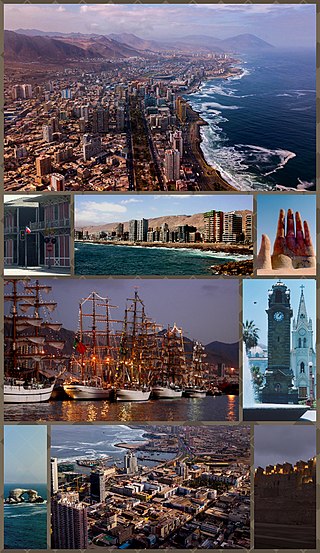
Antofagasta is a port city in northern Chile, about 1,100 kilometres (700 mi) north of Santiago. It is the capital of Antofagasta Province and Antofagasta Region. According to the 2015 census, the city has a population of 402,669.

An authoritarian military dictatorship ruled Chile for seventeen years, between 11 September 1973 and 11 March 1990. The dictatorship was established after the democratically elected socialist government of Salvador Allende was overthrown in a coup d'état backed by the United States on 11 September 1973. During this time, the country was ruled by a military junta headed by General Augusto Pinochet. The military used the breakdown of democracy and the economic crisis that took place during Allende's presidency to justify its seizure of power. The dictatorship presented its mission as a "national reconstruction". The coup was the result of multiple forces, including pressure from conservative groups, certain political parties, union strikes and other domestic unrest, as well as international factors.

Club Universidad de Chile is a professional football club based in Santiago, Chile, that plays in the Primera División.
Chilevisión is a Chilean free-to-air television channel. It is the third oldest Chilean television network, owned by Paramount Networks Americas, being founded by the University of Chile on November 4, 1960.

The Football Federation of Chile is the governing body of football in Chile. It was founded on 19 June 1895, making it the second oldest South American association football federation, and is a founding member of CONMEBOL since 1916. It supervises the Chile national football team, Chile women's national football team, Asociación Nacional de Fútbol Profesional: (National Association of Professional Football, originally called Asociación Central de Fútbol, or ACF, and Asociación Nacional de Fútbol Amateur.
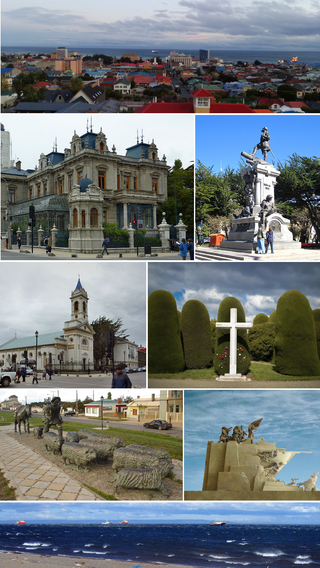
Punta Arenas is the capital city of Chile's southernmost region, Magallanes and Antarctica Chilena. Although officially renamed as Magallanes in 1927, the name was changed back to Punta Arenas in 1938. The city is the largest south of the 46th parallel south and the most populous southernmost city in Chile and the Americas. Due to its location, it is also the coldest coastal city with more than 100,000 inhabitants in Latin America. Punta Arenas is one of the world's most southerly ports and serves as an Antarctic gateway city.
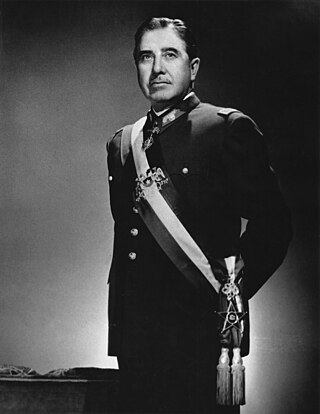
Augusto José Ramón Pinochet Ugarte was a Chilean general and President of Chile who ruled Chile from 1973 to 1990, first as the leader of the Military Junta of Chile from 1973 to 1981, being declared President of the Republic by the junta in 1974 and becoming the de facto dictator of Chile, and from 1981 to 1990 as de jure president after a new constitution, which confirmed him in the office, was approved by a referendum in 1980. His rule remains the longest of any Chilean leader.
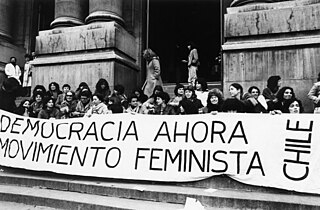
Feminism in Chile has its own liberation language and activist strategies for rights that is shaped by the political, economic, and social system of Chile. Beginning in the 19th century, Chilean women have been organizing with aspirations of asserting their political rights. These aspirations have had to work against the reality that Chile is one of the most socially conservative countries in Latin America. The Círculo de Estudios de la Mujer is one example of a pioneering women's organization during the Pinochet dictatorship (1973–1989) which redefined women's responsibilities and rights, linking “mothers’ rights” to women's rights and women's civil liberties. The founding members of the Círculo de Estudios de La Mujer consisted of a small group of Santiago feminists who were from the Academia de Humanismo Cristiano. These women gathered "to discuss the situation of women in Chile," their first meeting drew a crowd of over 300 participants and from there challenged the authoritarian life in Santiago. These women helped shape the rights for women in Chile.

















